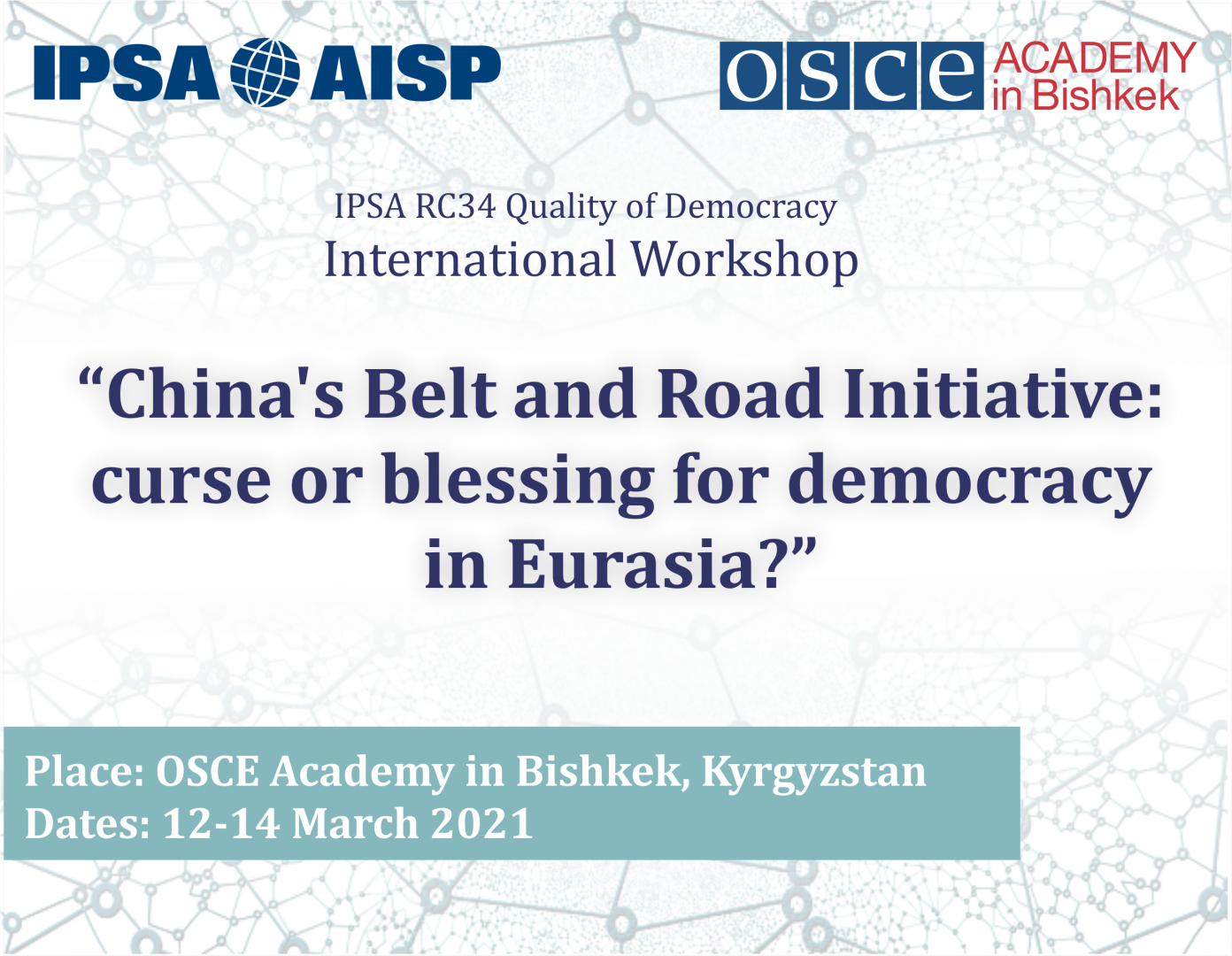

International Workshop: China's Belt and Road Initiative: Curse or Blessing for Democracy in Eurasia?
Fri, 12 Mar 2021 - Sun, 14 Mar 2021
Online
Organized by: IPSA RC34 Quality of Democracy & OSCE Academy in Bishkek
Contact: brigitte.weiffen@open.ac.uk
Event Description
China's New Silk Road Initiative (Belt and Road initiative, BRI) has been spinning its logistical and infrastructural web around the world since 2013. Massive infrastructural investments in tracks and roads as well as in the agricultural and energy sector and logistical centers were made in over 50 countries in Eurasia. BRI is a central component of Chinese investment policies that have affected core public policy areas in over 100 countries in the world. Almost a decade after the official launch of BRI, this workshop will assess its political implications. Contributors discuss the impact that BRI has had, willingly or not, on democratization or autocratization processes in the countries and societies that it invested in, ranging from Europe to the Middle East, Central Asia, and Southeast Asia.
The workshop will be conducted as an online event. Please register to attend. Registered participants will receive log-in instructions via e-mail!
Registration: https://forms.gle/vPcudRUKkCRptF3z9
Organization:
Brigitte Weiffen (Senior Lecturer, The Open University, Milton Keynes, and Chair of RC34), brigitte.weiffen@open.ac.uk
Anja Mihr (DAAD Associate Professor, OSCE Academy Bishkek), a.mihr@osce-academy.net
PROGRAM
The schedule is in Bishkek local time. Please convert to your local time (for example here: https://www.thetimezoneconverter.com/)
Friday 12 March 2021
14:00-14:30
Welcome notes
Alexander Wolters, Director, OSCE Academy, Bishkek, Kyrgyzstan
Introductory remarks
Anja Mihr, DAAD Associate Professor, OSCE Academy, Bishkek, Kyrgyzstan
Brigitte Weiffen, Senior Lecturer, The Open University, United Kingdom
14:30-15:30
Keynote Lecture: Future Impact of BRI in Eurasia
Richard Pomfret, Professor of Economics, University of Adelaide, Australia
15:45-17:00
Panel 1: BRI and political and economic transformation
The Belt and Road Initiative and Its impact on Human Rights and Democracy – A Mixed-Method Analysis
Débora Ramires Pelisson and Marketa Maria Jerabek, Postdoctoral research fellows, International Relations Institute, University of São Paulo, Brazil
Road to peace or bone of contention? The impact of the Belt and Road Initiative on conflict states
Pascal Abb, Senior Researcher, Peace Research Institute Frankfurt (PRIF), Germany, Rob Swaine and Ilya Jones, Saferworld
Does the Institutional Environment in the Host Country Matter? Determinants of Chinese Outward Foreign Direct Investment in the Belt and Road Initiative Countries
Dmitry Erokhin, Research assistant, International Institute for Applied Systems Analysis, Laxenburg, Austria
Saturday 13 March 2021
14:00-15:00
Keynote Lecture: Official visions of democracy in Xi Jinping's China
Heike Holbig, Professor, Center for Interdisciplinary Studies in East Asia, Department of Political Sciences, University of Frankfurt, Germany
15:00-16:00
Panel 2: Regime change and BRI
Black Knight Rising: China’s Strategies to Promote Autocracy around the World
Henoch Gabriel Mandelbaum, University of São Paulo (USP), Brazil, and Brigitte Weiffen, Senior Lecturer, The Open University, United Kingdom
Chinese surveillance technologies in the Eurasia. A catalysator for authoritarian tendencies or enabler of democratic reform
Tobias Burgers, Assistant Professor, Cyber Civilization Research Center, Keio University, Tokyo, Japan
16:30-18:00
Panel 3: BRI and Central Asia
Hitting Below the Belt: BRI and China’s Grand Strategy in Central Asia
Srdjan Uljevic, Senior Lecturer, American University of Central Asia, Bishkek, Kyrgyzstan
Kazakhstan responses to China’s security strategy in Xinjiang
Elzbieta Pron, Assistant Professor, University of Silesia in Katowice, Poland
Chinese foreign aid and Autocratization of Central Asia
Nurseit Niyazbekov, PhD, KIMEP University, Almaty, Kazakhstan
China’s Belt and Road Initiative and sustainable urban development in Central Asia: challenges for democratization of Central Asian societies
Artem Dankov, PhD, Director of Confucius Institute and Associate Professor at the Dept. of Global Politics, Tomsk State University, Russia
Sunday 14 March 2021
14:00-15:30
Panel 4: BRI’s impact on Regime Change in Asia and Africa
Autocratization by Linkage: The de-democratizing effect of Chinese investments in Africa
Eltion Meka, Researcher, University of New York Tirana, Albania
Belt and Road Initiative Strengths, Weaknesses, Opportunities and Threats: Afghanistan Perspectives
Abdullah Zahid, School of Public Affairs, Zhejiang University, Hangzhou, China
China’s Belt and Road Initiative: Impact on Democratization and Regime Change in Pakistan
Gul-i-Hina Shahzad, Doctoral Research Fellow, New Silk Roads Project, International Institute for Asian Studies (IIAS), Netherlands
Does the Belt and Road Initiative undermine democracy? Evidence from South Asia
Filippo Boni, Lecturer, The Open University, United Kingdom
15:45-17:00
Panel 5: BRI’s impact on Regime Change in Europe
China in Central Europe: Threat Perceptions, Influence, and Interference
Alica Kizekova, Senior Researcher, Institute of International Relations Prague, Czech Republic
Opportunities and Risks in the Implementation of the “One Belt, One Road” Initiative: A View from Ukraine
Yurii Poita, Head of the Asia-Pacific Section at the Center for Army, Conversion and Disarmament Studies, Ukraine
Is China’s New Silk Road Strengthening the Autocratic Apparatus of Belarus?
Prakash Raj, Doctoral Research Fellow, Department of Political Science, University of Hyderabad, India
17:00-18:00
Keynote Lecture: Varieties of Authoritarianism in Eurasia
Edward Schatz, Professor, University of Toronto, Canada











